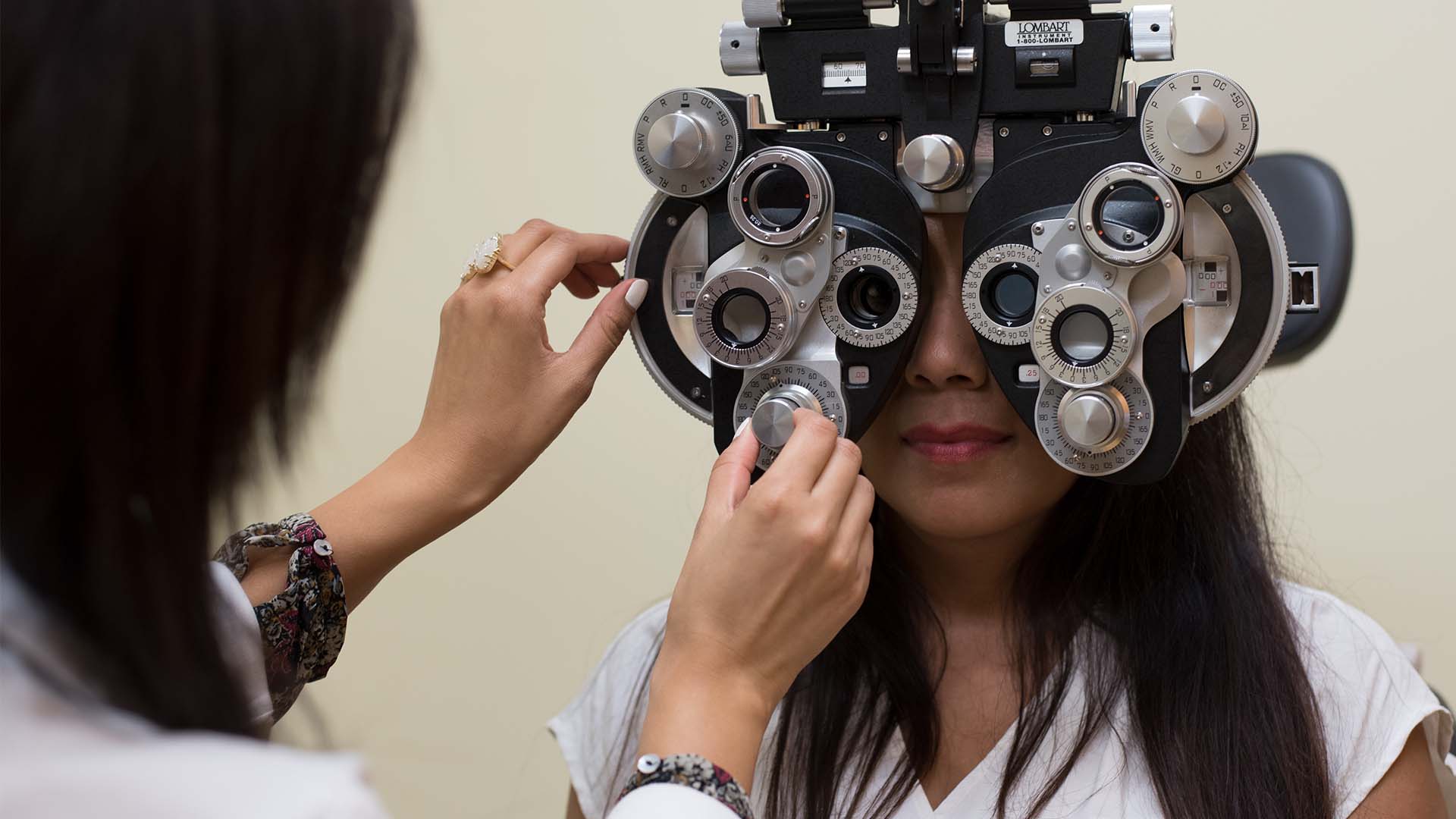The Rosenberg School of Optometry (RSO) is the only optometry school in the country associated with a faith-based institution emphasizing individualized attention and placing a high importance on our student’s personal growth and development.
The support system that is created through both the feel of family and appreciation of diversity is a tremendous source of guidance and strength for our students.
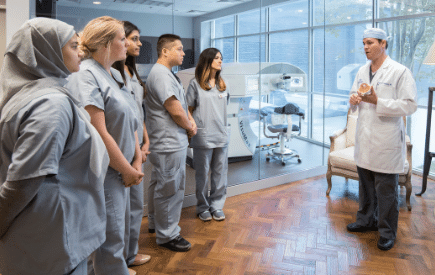
Doctor of Optometry
RSO offers the Doctor of Optometry (O.D.) with a four-year prescribed curriculum that integrates a classroom experience and patient contact, providing early exposure to clinical training captured through community outreach programs and rotations through clinics and externships.
Distinctive features of the curriculum include: case-based seminars, grand rounds, problem-based learning, incorporation of educational technologies such as the Binocular Indirect Ophthalmoscope (BIO) Simulation System, web-based learning, classroom performance system, digital libraries, podcasts and video conferencing.
Program Highlights
- One of the most diverse Optometry programs in the U.S.
- 31% of enrolled students are underrepresented minorities within the profession, which far exceeds the national average
- $1.8 million annual uncompensated care provided by UIW clinics
- 18 positions available across 11 residency programs
- Study Abroad opportunity in Europe
- Strong emphasis on community outreach including 7 international trips per year
- Paid Summer Fellowship Training Program for students interested in clinical research
- 18 student organizations focused on Optometry offering opportunities for academic and professional development
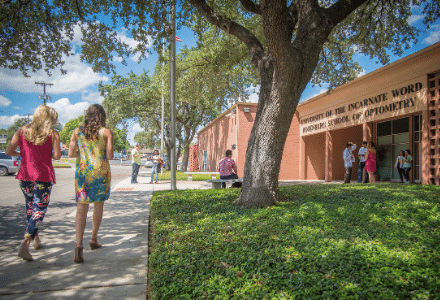
State-Of-The-Art Facilities
RSO offers state-of-the-art clinical facilities in San Antonio for students to learn and grow including the UIW Eye Institute located on site of the main facility and the UIW Bowden Eye Care and Health Center, located on the eastside of the city. Both clinics are equipped to provide comprehensive care to an underserved population.
Large Texas Clinical Network
In all, the UIWRSO clinical network stretches from San Antonio to the Dallas-Fort Worth area. Students are educated to the highest level of care. The rotations within the UIWRSO clinical network include direct supervised patient care in Cornea and Contact Lens, Ocular Health, Peri-Operative, Visual Neurophysiology (VNS), Low Vision and Rehabilitation, Dry Eye, Vision Therapy and Binocular Vision, Pediatrics, Retina, Neuro-Rehab, Glaucoma, Sports and Vision Enhancement, and Adult Care Services.
By the Numbers
68
Average Incoming Class Size
90%
Retention Rate
18
Student organizations focused on Optometry
UIW Rosenberg School of Optometry
Advanced, cutting-edge and progressive – all are words that describe the learning environment of the UIW Rosenberg School of Optometry.
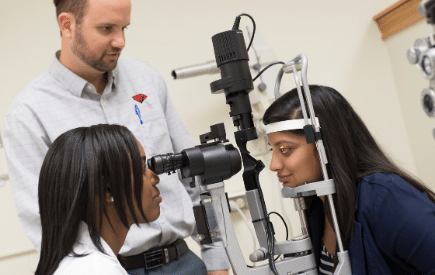
Rolling Admissions
The Rosenberg School of Optometry admits qualified applicants on a rolling basis. In addition to the academic aspects of your application (GPA, OAT scores), we look for applicants who have shown an active interest in optometry (shadowing, volunteering) and who embrace our mission of service.
Merit Scholarships
Merit-based awards are awarded based upon qualifying academic, service and leadership factors. These scholarships currently range from $1000 to help offset books, supplies and equipment to $8000 to help significantly mitigate the cost of attendance. We also track more than 100 public scholarships and awards for your benefit.
Direct Admit Scholarships
Highly qualified first-time freshmen may be eligible for direct admission to the Rosenberg School of Optometry on a conditional basis, pending overall GPA, SAT/ACT and other requirements. Students who graduate from a Texas high school and are accepted into the direct admit program receive a $2,500 scholarship per year for full-time study, renewable for up to eight years.
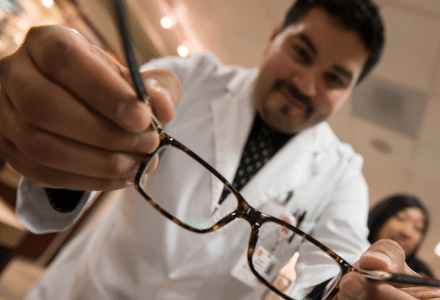 Bachelor of Science in Vision Science
Bachelor of Science in Vision Science
UIWRSO offers a Bachelor of Science degree in Vision Science which is a pre-optometry pathway. This is the only program in the country where undergraduate students spend a substantial amount of time learning under the guidance and supervision of clinical academic faculty and professional staff in both the classroom and out-patient clinical settings.
Master of Science in Vision Science
The Vision Science graduate program provides a broad, graduate-level core curriculum in vision science, optics, binocular vision, ocular anatomy, physiology, genetics, statistics, and research methodology.
PhD in Vision Science
The Doctor of Philosophy (PhD) degree in Vision Science ensures that the successful graduate acquires knowledge, skills, and abilities, as well as experience and focused training to conduct independent research in Vision Science. The program provides a broad, graduate-level core curriculum in vision science, optics, binocular vision, ocular anatomy, physiology, genetics, statistics, and research methodology.
Accredited School of Optometry in The United States
As stated on the ACOE website, both the U.S. Department of Education and the Council on Higher Education Accreditation recognize the ACOE as a reliable authority concerning the quality of education of the programs the Council accredits. ACOE accreditation means the programs that have attained accredited status:
- Meet the Council’s standards of educational effectiveness; and
- Show a demonstrated commitment to quality assessment and improvement
For more information on the ACOE and the accreditation process, please visit the ACOE website.
University of the Incarnate Word is accredited by the Southern Association of Colleges and Schools Commission on Colleges (SACSCOC) to award associate, baccalaureate, masters, doctorate and professional degrees. Questions about the accreditation of University of the Incarnate Word may be directed in writing to the Southern Association of Colleges and Schools Commission on Colleges at 1866 Southern Lane, Decatur, GA 30033-4097, by calling (404) 679-4500, or by using information available on SACSCOC’s website ( www.sacscoc.org).


Lauren Bartholomew ’18 OD


